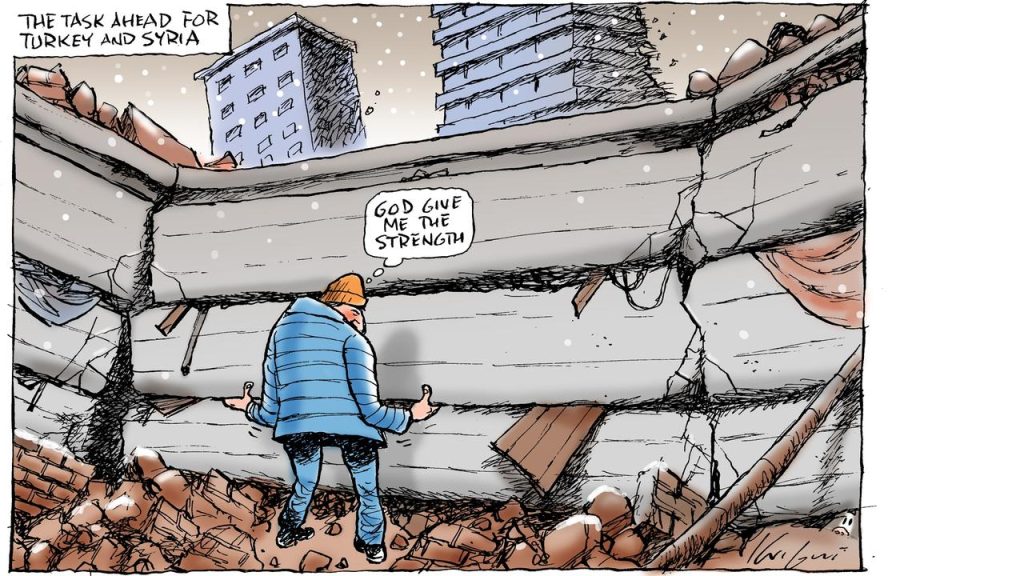“People lost their homes, workplaces and cars on top of losing a wife, friend, brother, sister, uncle or aunt,” said Hikmet Cincin, the chairman of the Antakya Chamber of Trade and Industry. “It’s not just three or five people with this dramatic story but thousands of people.”
Antakya’s industrial area has lost up to two-thirds of its workplace, Cincin told DW, and urgently needs rebuilding.
“In our small industrial estate, almost 1,500 to 1,700 of the 2,500 workplaces have collapsed,” he said pointing to the devestation around him in Antakya, the capital of Tukey’s Hatay province.
Of the 11 provinces hit by the earthquake on February 6, Hatay, Kahramanmaras and Adiyaman in southeastern Turkey were the most severely affected. The region is rich in textile manufacturing and agriculture and provides around 11% of Turkey’s industrial production.
Ahead of an international donor conference organized by the European Union on March 20, the heads of business associations from these three provinces told DW that they aren’t only worried about the damage to places of business. They are also concerned about the severe labor shortage the region is facing.
The quake triggered a mass exodus of workers because many were made homeless, they said.
Hikmetz Cincin in front of collapsed building in the town of Antakya, TurkeyHikmetz Cincin in front of collapsed building in the town of Antakya, Turkey
How to bring back skilled labor
Although some businesses managed to restart operations a month after the earthquake, they were operating far below capacity because they lacked skilled workers. Those who survived the quake had moved to nearby villages or to other cities.
“Kahramanmaras still couldn’t move into production. It lost its qualified labor force,” Mustafa Buluntu, chairman of the board of directors at Kahramanmaras Chamber of Trade and Industry told DW. The priority is to win employees back and to solve the housing problem as quickly as possible, he added.
Kahramanmaras had 1.1 million people before the earthquake, but Buluntu estimates the population has now plunged to around 200,000. The accommodation problem still isn’t resolved more than 40 days since the quake, he said.
More than 600,000 homes collapsed or were severely damaged across the region, according to official data. The government has promised to build at least 250,000 units of accommodation within a year.
But industry leaders in the region say that’s not quick enough to retain workers.
“When a worker is worried about the possibility of the top of his tent flying [away] or about taking a shower with hot water,” pledging permanent accommodation in a year or 18 months’ time “doesn’t solve the problem,” said Cincin from Antakya Chamber of Trade and Industry.
Amenities such as toilets and showers have virtually disappeared, and the lack of sanitation is causing a desperate situation in the Hatay province.
He is worrried “temporary” migration could turn into a “permanent” one in Hatay, estimating that the province, where more than 1.6 million people lived before the quake, has lost more than three fifths of its population.
Call for ‘super incentives’
Business associations in the region are also calling for the government to put so-called super incentive mechanisms into effect. These are state-funded investment incentives originally meant to foster economic growth by stimulating industrial production and boosting exports.
The packages worth a total of 135 billion Turkish lira (€6.69 billion or $7.11 billion) are aimed at sectors such as technology, petrochemicals, energy, metals and mining, health care, manufacturing and agriculture.
“There should be many incentives to prevent migration. Adiyaman should be declared a super incentive zone,” said Gani Bereket, chairman of the assembly at the Adiyaman Chamber of Trade and Industry, about the situation in his hometown.
“People have started to leave the cities out of anxiety and fear. There is not a single house to live in, and sanitary conditions are bad; there are no toilets,” Bereket told DW.
Cincin and Buluntu also urge for targeted super incentives as some areas are worse affected than others.
Even before the earthquake, Turkey was facing major economic challenges with soaring inflation, a depreciating currency and high unemployment.
Financial burden
The government has rolled out short-work allowances for workers, made access to loans for affected companies easier and delayed some debt payments following the quakes.
But financial problems weigh on the industrialists.
“There were very big, very indebted companies. If no precautions are taken, those firms will collapse in a couple of months,” said Buluntu from Kahramanmaras Chamber of Commerce.
Cincin in Antakya tells the story of one of the city’s chamber of commerce members who had 20 supermarkets before the quake.
“Thirteen of them collapsed and seven of them were looted. The bank calls on the third day of the earthquake and asks if he will pay his debt or restructure,” he said, adding that they expect more “compassion” from private banks.
Gaziantep ‘still in survival mode’
Now there is fear that businesspeople could join the exodus if incentives aren’t put into place soon.
“Nowadays what I am hearing from our members is ‘Brother, we should go too, enough is enough, we can’t take it anymore’,” said Bereket from Adiyaman’s Chamber of Commerce.
The region isn’t just reliant on government efforts to help with economic recovery. Turkish industrialists started organized private initiatives to help rebuild the economy while international oranizations are also involved.
All three businessmen say it could take years for the region to see its economy return to normal. But, they added, they will stay nevertheless and continue to assist the business community.
“We feel happy when we see a tradesman’s lamp on in the bazaar,” Bereket said.
dw.com
